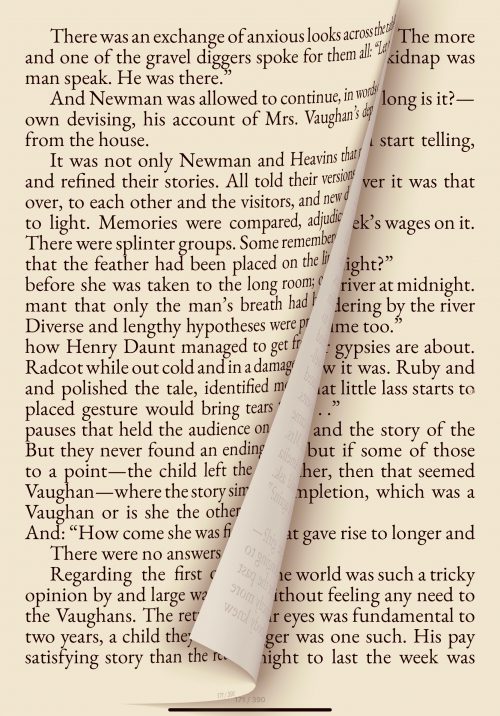Once Upon a River
Once Upon a River – Diane Setterfield

It is a tale, told by an…
Wait, I was in a tavern on the banks of the Thames…
Wait.
“When a story is yours to tell, you are allowed to take liberties with it—” page 12.
Wait, it does start, like a good English tale, at a tavern on the banks of the Thames River.
It’s a leap, some days, but the first opera in Wagner’s Ring Cycle has passing set of symbols, the Ash Tree, roots, and underwater critters frolicking. Naiads and such, maybe?
At first blush, with high recommendations from the book-reading list-serv, I thought this was like a river, slowly ebbing, but there’s an intrinsic dance to the language, and staying onboard with the twisting narratives that loop back upon each other makes for an exciting tale. Or series of intertwining stories.
“Every detail of the day’s events was gone over, the facts were weighed and combined, quantities of surmising, eavesdropping, and supposition were stirred in for flavor, and a good sprinkling of rumor was added like yeast to make it rise.” Page 135.
Tales of tales, and what has gone before. Musical note?
“Don’t pay the ferryman — don’t even set a price.” (Anyone?)
Anyway, the book?
Winter Solstice is a magic time because the dark lasts the longest.
“They sat on the bank. It was better to tell such stories close to the river than in a drawing room. Words accumulate indoors, trapped by walls and ceilings. The weight of what has been said can lie heavily on what might yet be said and suffocate it.” Page 296.
Faulkner. No, but close. Twain, in one of my favorite novellas, treated this similar, in parts.
The novel — my day job is astrologer so I am naturally attuned to giant wheel in the sky upon which we all turn — and like the spokes of the wheel, the story looks at points of the novel that are set at Winter Solstice, Equinoxes, and annual floods, as presaged by those seasons and cardinal points. Summer Solstice.
The essential narrative is marked, supported by bookends, Winter Solstice, Spring Equinox, Summer Solstice, but then the next winter solstice is different.
Living in Austin, in the span of a single decade, I saw the Hundred Year Flood three times. And so the book ends with a flood, of biblical proportions — and a nod to older belief systems.
Tom Stoppard wrote a play about Oscar Wilde and Charon, floating along in a punt, ostensibly the River Styx. An image from that stage version haunted me throughout the novel.
As a respite from frantic holiday times, the book was slow and literate, beautifully crafted prose, almost poetic, in a way, and reminded me of the Colorado River, winds from Austin to the Gulf of Mexico, looping back and forth across the roadways, meandering, but only once in recent memory, spilling over its banks.
Same essence with the book and its tales.
Once Upon a River
Once Upon a River – Diane Setterfield
Once Upon a River: A Novel